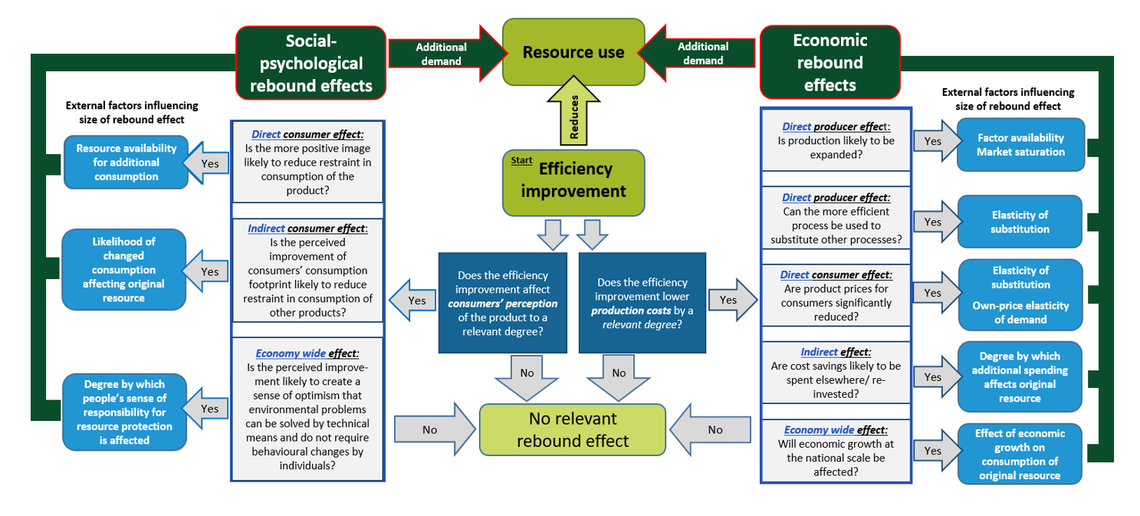Assessment Challenges
Rebound Effects

Improvements in the technical efficiency of production processes are a means to reduce resource consumption. However, reductions achieved under real life conditions are usually smaller than what would theoretically be expected under ceteris paribus assumptions. Relevant actors (producers and consumers) will adapt their behaviour to account for the increased efficiencies, often causing additional resource use. This is called rebound- or take back effect. Rebound effects offset part or all of the resource savings that would otherwise be achieved by efficiency improvements. In extreme cases, they can even lead to an increase of total resource consumption (Jevons’s paradox). Rebound effects are mainly explained by economic feedbacks. However, social-psychological factors are also relevant, especially for the consumer side.
Rebound effects can be divided into direct effects, indirect effects and economy-wide effects. They should be taken into account in all assessments dealing with efficiency improvements in order to obtain realistic estimates of resource savings and to adequately inform policy making.
In many cases of efficiency increases, ex-post analysis reveals that reductions in total resource consumption are smaller than could be expected based on efficiency improvements. This effect is called rebound- or take back effect and results from changes in the behaviour of relevant actors after efficiency increases. The size of rebound effects (Equation. 1) is defined as the share of resource savings which would be expected from efficiency increases if all other factors remained unchanged (ceteris paribus situation), but which do not materialise due to adaptions in the behaviour of relevant actors.

Equation 1: Definition of rebound effect size
Rebound effect sizes vary and can be greater than 100% in extreme cases. This phenomenon is called backfire or Jevons´s paradox, after British economist W.S. Jevons who observed in his book “The coal question” (1865) that more efficient use of coal through technical innovation led to higher instead of lower total consumption. Based on this, he postulated that higher fuel efficiencies always led to higher resource exploitation (Jevons, 1865; Alcott, 2005). The same theory was reiterated in the 1980s by economists Khazzoom and Brookes and termed by Saunders (1992) the Khazzoom–Brookes postulate. While Jevons’s paradox was formulated for the energy sector, cases where both resource use efficiency and total resource use increased are also documented in the agricultural sector for increases in irrigation efficiency (Pfeiffer & Lin, 2014; Sun et al., 2016; Perry et al., 2017).
Rebound effects are best documented for the field of energy efficiencies but is also applicable to the efficient use of other resources relevant to agricultural management. The majority of studies on rebound effects focus on rebound effects occurring due to economic feedbacks, as more efficient resource use lowers production costs and the price of goods and services based on the respective resources. Under the assumption of rational economic agents, this price effect leads to increased production and/or consumption, thereby offsetting part or all of the initial resource savings (Kolstad et al., 2014). However, de Haan et al. (2015) point out that especially for consumers, the assumption of purely rational behaviour is not valid, and that social-psychological factors can also create rebound effects. Policies promoting efficiency increases can affect both economic variables and social-psychological factors thereby causing both forms of rebound effects.
Rebound effects can be divided into a) direct , b) indirect and c) economy-wide effects (Kolsadt et al., 2014). For rebound effects to occur, the resource use efficiency of a process must improve. In this section, we use the term process to refer to production processes which consume resources in order to provide services. These services can be immaterial (e.g. light, heat) or material (e.g. food, drinking water) and explicitly include the production of goods.
a) Direct rebound effects
Direct rebound effects occur if efficiency increases in a process result in an increasing demand for it, thereby also creating additional demand for the resource it consumes.
From an economic point of view, higher efficiencies mean lower production costs. This can motivate producers to increase production. Furthermore, producers may opt to use the more efficient process to substitute other production factors. Where lower costs result in lower prices, consumers usually react to this with increased consumption which in turn creates demand for increased production.
From a social-psychological point of view, services produced by processes that consume fewer resources are perceived as more positive than those produced conventionally. This is especially the case if those services are labelled as socially or environmentally friendly (e.g. energy from renewable sources). Where consumers restrict their consumption due to awareness of resource use implications, they may be less hesitant to consume services from more efficient processes, thereby creating additional demand.
b) Indirect rebound effects
Indirect rebound effects occur if efficiency increases in a process result in an increasing demand for other processes that consume the same resource.
Where higher efficiency translates into financial gains for producers and/or consumers, all or part of this money is usually spent on additional consumption of goods and services. For example, if households switch to more energy efficient appliances, they will save on energy consumption and money. However, if this money is used to pay for a holiday flight, part or all of the savings are offset in an indirect rebound effect.
From a social-psychological point of view, de Haan et al. (2015) argue that many consumers implicitly evaluate their own behaviour and apply a budget to their resource consumption. Being more environmentally friendly in one respect therefore may lead to less self-restriction in other areas.
c) Economy-wide rebound effects
Economy wide effects are caused if not only individual actors are affected by the efficiency gains, but if there are resource use implications for the whole economy through increases in wealth, production or consumption; or through the introduction of technological innovations made possible by the more efficient process. For example, the introduction of chemical fertilizer dramatically increased the productivity (crop yield per hectare) of agricultural production, but had implications that also affected economies as a whole.
Increasing resource use efficiency (RUE) is considered to create a win-win situation by improving farmers’ economic performance while at the same time alleviating pressures on the environment (O´Brien et al., 2014). However, different actor groups may react to such efficiency increases and cause rebound effects that offset part or all of the potential resource savings. In extreme cases, resource consumption can even be higher after efficiency increases than before. Not accounting for rebound effects can therefore result in a severe overestimation of resource savings.
For the agricultural sector, there are a number of studies on rebound effects related to more efficient irrigation technologies (Berbel & Mateos, 2014; Dumont et al., 2013; Loch & Adamson, 2015; Mehmeti et al., 2016), some of them reporting rebound effects greater than 100% i.e. an increase in resource use rather than a reduction. Pfeiffer & Lin (2014) report an example from western Kansas/USA, where a shift to more efficient irrigation technologies correlated with increased total water use. They explain this effect by farmers changing from non-irrigated to irrigated crops, reducing fallow periods and increasing per hectare irrigation. Similarly, Sun et al. (2016) found that increased water use efficiencies in Bayannur/Inner Mongolia in the period between 2000 and 2010 coincided with increased total water consumption. These authors state that savings were utilised to increase production rather than to alleviate pressures on the environment. In a global FAO review on improved irrigation technology, Perry et al. (2017) concluded that the introduction of high-tech irrigation without accompanying controls on water allocation usually results in an increase rather than a reduction of water use.
Several studies also address rebound effects related to higher agricultural yields in the context of the land sharing vs. land sparing debate (Mertz & Mertens, 2017; Phalan et al., 2011). Lambin & Meyfroidt (2011) discuss potential implications of rebound effects from raising agricultural productivity on the global demand for agricultural land. Ewers et al. (2009) show in a global study on yields and land use between 1979 and 1999 that land sparing occurred in some cases, but that for developed countries there was no evidence that increases in agricultural productivity resulted in lower per capita cropland demand. Addressing the link between agricultural productivity and greenhouse gas emissions, Valin et al. (2013) used the partial equilibrium model GLOBIOM to assess options for meeting the projected global food demand in 2050. In a scenario where all additional production was achieved through higher yields, they found strong demand-side rebound effects that reduced potential greenhouse gas savings by 50%. Studies on rebound effects related to efficiency increases in the agricultural use of other resources are mostly lacking. For a review on rebound effects in agriculture and an assessment of their relevance for emerging soil management practices, see Paul et al. (2019).
Impact assessments of efficiency measures need to consider potential rebound effects to ensure correct estimates of resource savings and to allow for an unbiased comparison between alternatives for reducing resource consumption. Assessment results that identify a risk of rebound effects can also be used to support the design of measures aimed at mitigating or preventing such effects.

Figure 1: Framework for assessing economic or socio-psychological rebound effects from efficiency improvements. Factors determining the size of the rebound effects are presented in the blue boxes (Paul et al., 2019).
To assess rebound effects, it is useful to first determine whether economic or socio-psychological preconditions are fulfilled. Only if the efficiency increases result in lower production costs or affect consumers’ perception of the final products are rebound effects likely to occur. While these conditions are usually met to some degree (and rebound effects therefore common), the actual cost reduction or change in consumers’ perception may be very minor and the size of the resulting rebound effects too small to be of relevance. What effect sizes are considered relevant must be determined individually within the context of a particular assessment.
Paul et al. (2019) present a framework for assessing rebound effects in agricultural land and soil management (Figure 1). Similar to a flow chart, users can answer “yes” or “no” questions to find out whether the occurrence of different rebound types is likely. Factors determining the size of the rebound effects are given in blue boxes.
There is scientific consensus regarding the existence of rebound effects, but little agreement on their size. Values provided in scientific literature for increases in energy efficiency vary considerably (for an overview of studies, see Huesemann & Huesemann, 2008 and Kolstad et al., 2014). However, while it is difficult to estimate effect sizes, the implicit assumption of zero rebound effects made by studies that choose to ignore them is not supported by scientific evidence (Maxwell et al., 2011).
De Haan et al. (2015) discuss complications involved in assessing the size of rebound effects and argue that studies based on top-down evaluations of time series tend to overestimate effect sizes due to problems of separating increased resource consumption caused by economic growth and increasing consumers’ wealth from increased resource consumption caused by increased efficiencies. On the other hand, they consider process-based, bottom-up studies to generally underestimate rebound sizes because they cannot account for economy-wide effects.
Because rebound effects result from changes in the behaviour of different actors and are based on multiple variables, it is challenging to assess their effect size (particularly in ex-ante assessment). In many cases, only a very rough estimate will be possible. For rebound effects resulting from economic feedbacks, general equilibrium models can help to estimate reactions of market participants. For rebounds due to social-psychological factors, a major research gap exists. (Maxwell, 2011). The use of the rebound effect assessment framework (Paul et al., submitted) may facilitate an assessment of rebound effect sizes. In general, the following factors are considered to be positively related with the size of rebound effects (de Haan et al., 2015):
Relative size of the efficiency improvement (%)
Relative share of savings of total production costs (%)
Degree to which production is limited by availability of the more efficiently used resource (e.g. limited allocation of irrigation water, limited amount of allowable fertiliser application)
Degree to which the more efficient process can be used to substitute other production factors
Relative price reductions for the final product (%)
Degree by which the consumption of the product is perceived as more positive (e.g. social or environmentally friendly) than before
Demand elasticity, degree to which is demand is currently unsaturated
Low degree of other costs associated with product consumption (e.g. in the field of mobility, travel-time is often more relevant than travel-cost)
Degree to which the more efficiently used resource is also used in the production of alternative goods and services (the demand for which might increase with increasing wealth)
Degree to which the more efficient resource use triggers technical innovation in other sectors
Alcott B. 2005. Jevons' paradox. Ecol. Econ., 54, 9–21, DOI:10.1016/j.ecolecon.2005.03.0
Berbel J, Mateos L. 2014. Does investment in irrigation technology necessarily generate rebound effects? A simulation analysis based on an agro-economic model. Agricultural Systems, 128, 25–34. DOI:10.1016/j.agsy.2014.04.002
De Haan P, Peters A, Semmling E, Marth H, Kahlenborn W. 2015. Rebound-Effekte: Ihre Bedeutung für die Umweltpolitik. TEXTE 31/2015, Umweltbundesamt, Dessau-Roßlau, 112 pp.
Dumont A, Mayor B, López-Gunn E. 2013. Is the rebound effect or Jevons paradox a useful concept for better management of water resources? Insights from the irrigation modernisation process in Spain. Aquatic Procedia 1, 64–76.
Ewers R M, Scharlemannz J P W, Balmford A, Green R E. 2009. Do increases in agricultural yield spare land for nature? Global Change Biology, 15, 1716–1726. DOI:10.1111/j.1365-2486.2009.01849.x
Gómez C M, Pérez-Blanco C D. 2014. Simple myths and basic maths about greening irrigation. Water Resources Management, 28, 4035–4044. DOI:10.1007/s11269-014-0725-9
Huesemann M H, Huesemann J A. 2008. Will progress in science and technology avert or accelerate global collapse? A critical analysis and policy recommendations. Environ. Dev. Sustain. 2008, 10, 787–825, DOI:10.1007/s10668-007-9085-4
Jevons W S. 1865. The coal question. An inquiry concerning the progress of the nation, and the probable exhaustion of our coal mines. 1st edition, Macmillan & Co., London & Cambridge.
Kolstad C, Urama K, Broome J, Bruvoll A, Cariño Olvera M, Fullerton D, Gollier C, Hanemann W M, Hassan R, Jotzo F, Khan M R, Meyer L, Mundaca L. 2014. Social, Economic and Ethical Concepts and Methods. In: Climate Change 2014: Mitigation of Climate Change. Contribution of Working Group III to the Fifth Assessment Report of the Intergovernmental Panel on Climate Change [Edenhofer O, Pichs-Madruga R, Sokona Y, Farahani E, Kadner S, Seyboth K, Adler A, Baum I, Brunner S, Eickemeier P, Kriemann B, Savolainen J, Schlömer S, von Stechow C, Zwickel T, Minx J C (eds.)]. Cambridge University Press, Cambridge, United Kingdom and New York, NY, USA.
Lambin E F, Meyfroidt P. 2011. Global land use change, economic globalization, and the looming land scarcity, PNAS, 108 (9), 3465–3472. DOI:10.1073/pnas.1100480108
Loch A, Adamson D. 2015. Drought and the rebound effect: a Murray–Darling Basin example. Natural Hazards, 79, 1429–1449. DOI:10.1007/s11069-015-1705-y
Maxwell D, Owen P, McAndrew L, Muehmel K, Neubauer A. 2011. Addressing the Rebound Effect, report for the European Commission DG Environment, 26 April 2011.
Mehmeti A, Todorovic M, Scardigno A. 2016. Assessing the eco-efficiency improvements of Sinistra Ofanto irrigation scheme. Journal of Cleaner Production, 138, 208–216. DOI:10.1016/j.jclepro.2016.03.085
Mertz O, Mertens C F. 2017. Land sparing and land sharing policies in developing countries – drivers and linkages to scientific debates. World Dev. 2017, 98, 523–535, DOI:10.1016/j.worlddev.2017.05.002 .
O’Brien D, Shalloo L, Crosson P, Donnellan T, Farrelly N, Finnan J, Hanrahan K, Lalor S, Lanigan G, Thorne F, Schulte R. 2014. An evaluation of the effect of greenhouse gas accounting methods on a marginal abatement cost curve for Irish agricultural greenhouse gas emissions. Environmental Science & Policy, 39, 107–118. DOI:10.1016/j.envsci.2013.09.001
Perry C, Steduto P, Karajeh F. 2017. Does improved irrigation technology save water? A review of the evidence. FAO: Cairo, Egypt, 2017; pp. 42, ISBN 978-92-5-109774-8 .
Pfeiffer L, Lin C-Y C. 2014. Does efficient irrigation technology lead to reduced groundwater extraction? Empirical evidence. Journal of Environmental Economics and Management, 67, 189–208. DOI:10.1016/j.jeem.2013.12.002
Phalan B, Onial M, Balmford A, Green R E. 2011. Reconciling food production and biodiversity conservation: land sharing and land sparing compared. Science 2011, 333, 1289–21291, DOI:10.1126/science.1208742 .
Sun S, Wang Y, Liu J, Cai H, Wu P, Geng Q, Xu L. 2016. Sustainability assessment of regional water resources under the DPSIR framework. Journal of Hydrology, 532, 140-148. DOI:10.1016/j.jhydrol.2015.11.028
Saunders H D. 1992. The Khazzoom-Brookes Postulate and Neoclassical Growth. The Energy Journal, 13 (4), 131-148.
Valin H, Havlík P, Mosnier A, Herrero M, Schmid E, Obersteiner M. 2013. Agricultural productivity and greenhouse gas emissions: trade-offs or synergies between mitigation and food security? Environmental Research Letters, 8,035019 (9 pp.). DOI:10.1088/1748-9326/8/3/035019
4. What factors are difficult to assess?
-
Rebound Effects
- Leakage Effects
- Additionality
